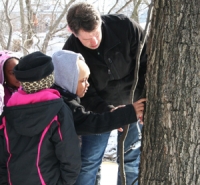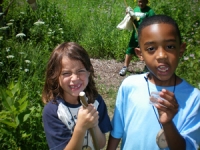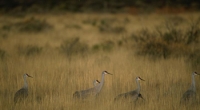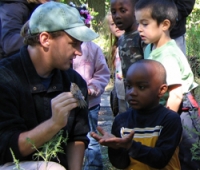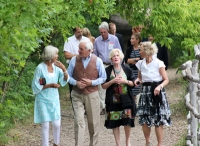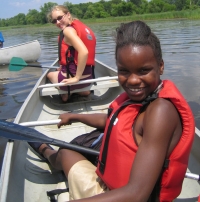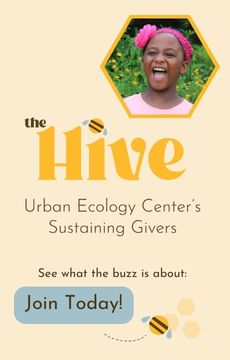

Beth Heller
Senior Director of Education and Strategic Planning, Beth received her Masters in Business Administration from UW-Milwaukee in 2005, where she received the Outstanding Business Plan award for a plan to launch a branch of the Urban Ecology Center in Washington Park. She graduated from Lawrence University in Appleton, WI in 1994 with a B.A. degree in Biology and Education. Beth began working at the Urban Ecology Center in 2000 to combine her love of the city with her appreciation of nature. Beth loves to sail, bike, sing and hike.
Impact of Urban Nature
When we started this project we now affectionately call the Urban Ecology Center, we had a dream, a concept for implementation and a process to get us there. Our expectations for success have been significantly exceeded – never in our wildest dreams did we expect to have three vibrant environmental community centers up and running so soon from our beginnings in a trailer parked in Riverside Park. But are we really having the impacts we set out to accomplish? Are students really learning? Are our parks, that we claim are now safe, really being used? Is providing nature in the city and exposing people to it really making a difference? And how do we actually know?
Every Kid Belongs in Summer Camp
Eight year old Sammy has just found a soft-shelled turtle along the Milwaukee River. It is visible only because it was startled when the group of summer campers came just close enough to this very well-camouflaged Riverside Park resident for it to make a run for the more protective waters.
Sammy calls to his new friend, John, saying “Look at this turtle. What a weird nose!” The two excitedly watch as the turtle looks back for a moment then dives into the river. They giggle a little as the carapace disappears under the surface of the water.
Memorable Moments
"...the crisp, prehistoric roar of thousands of cranes filled our ears and our heads so fully that we almost needed ear plugs. Their wild calls resonated in our lungs, bones and hearts."
As I’ve, ahem, matured, I’ve noticed that memory is a tricky thing. Sometimes I remember things from years ago as though they happened just moments ago. Sometimes things that happened yesterday are as foggy as if they happened years ago. Today, I’m excited to share something that happened years ago, but I can recall it as if it just happened.
Sustainable Solutions
Moments before 7am on a cold Tuesday morning, Jaimie Cloud, an education for sustainability expert from New York, and I dashed up the steps of Carmen High School. We were greeted by an enthusiastic math teacher and student and guided to the classroom. There, very professional looking students anxiously prepared to share their projects with us. These students spent the previous three weeks learning about sustainability: economic, ecological and equitable understandings of the world around them. They were charged with researching, analyzing and visualizing a project that improved the sustainability of their school.
Finding Inspiration in the Corporate World
Finding meaningful, inspiring stories of impactful corporate leadership in environmental sustainability for many may seem like a fantasy. From my experience, I know this kind of leadership is not only alive and well in our business community but also essential to our collective future. Forward thinking corporate leaders and employees use their ingenuity to think beyond the bottom line of the current quarter and plan for the future. This kind of leadership and the thinking that it is built upon is possible and it’s game changing.
Greater and Greener: A Global Perspective on Urban Parks
Imagine walking up two flights of stairs under a decommissioned, elevated freight rail surrounded by high rises, street vendors and droves of people. As you reach the platform, you emerge into the lush greenery of a vibrant park buzzing with thousands of visitors.
Get Outside and Play… Doctor’s Orders!
Who knew that when our parents told us to go outside and play they were dispensing medical advice? In the September/October issue of the newsletter I mentioned “Indoor Sickness”, a term coined by Dr. Daphne Miller, that increasingly is gaining attention from medical professionals. “Indoor Sickness” is an umbrella term for diseases linked to a sedentary lifestyle.
Copyright © 2023 The Urban Ecology Center

